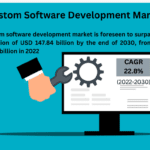
In the ever-changing world of technology, the role of Artificial Intelligence (AI) is becoming increasingly prominent. This blog post explores how Artificial Intelligence affects the job landscape, delving into the ongoing debate on whether AI will create more jobs than it replaces, as well as its potential negative impact on employment and the economy. We’ll take a close look at how AI is shaping job geography and how it will affect jobs, discussing the potential consequences, opportunities, and the figures involved.
How Will Artificial Intelligence Affect The Job Market
The Growing Part of AI in the Job Market
The world of work is no foreigner to Technological advancements, but AI’s influence is unique. It’s not just about automating homemade tasks, it’s about making machines suppose and learn. AI systems are designed to mimic mortal intelligence and perform tasks similar to data analysis, speech recognition, and decision- making. As AI capabilities expand, its integration into colorful diligence is changing the nature of jobs.
In this rapidly changing Time, it’s essential to consider both the implicit negative impacts and the openings AI presents for job campaigners, workers, and employers. Let’s dive into the ongoing debate on whether I’ll produce or exclude jobs.
Will AI produce more Jobs than It Destroys?
The debate surrounding AI’s impact on employment is of considerable interest. On one side, there are enterprises about AI’s eventuality to displace traditional jobs, leading to a negative impact on employment. The fear of AI-driven robotization is real, and it’s not unsupported. AI systems are formerly being used to automate routine tasks in colorful diligence, from manufacturing to client service. The solicitude is that this trend will continue, causing severance for numerous.
Still, there’s another side to the debate. Proponents argue that while AI may displace Certain Jobs, it also has the implicit ability to produce new bones. AI’s growth energies job openings in AI development, data wisdom, and related fields. The demand for AI professionals is on the rise. These places are near technical chops and knowledge, and they’re in the van of the Technological Revolution.
AI’s Impact on Jobs
To understand the global impact of Artificial Intelligence (AI) on jobs, we need to examine its effects in the job market. AI is fundamentally changing the way we work, and while it does replace certain jobs, it’s also reshaping others. There are some crucial areas where AI is making a mark on the job landscape.
Robotization and Job Dislocation
AI Technologies are decreasingly able to automate routine tasks. This has led to job relegation in several sectors, such as manufacturing and client service. The fear of machines taking over mortal tasks is a valid concern. Still, it’s pivotal to note that this robotization also enhances effectiveness and productivity in this diligence.
AI and Job Creation
While some jobs may be replaced, AI is also creating new bones. The development, conservation, and advancement of AI systems bear professed professionals. Data scientists, machine literacy masterminds, and AI experimenters are in high demand. These places not only involve erecting AI systems but also understanding and optimizing their functioning.
Impact on Specific diligence
The influence of AI varies across diligence. In healthcare, AI is aiding in diagnostics and treatment planning, perfecting patient care. In finance, it’s used for fraud discovery and algorithmic trading. While, In manufacturing, AI-driven robotization streamlines product processes. In client service, chatbots handle inquiries and support. AI’s impact is pervasive and has the implicit ability to revise colorful sectors.
Profitable and Societal Counter Accusations
The profitable and societal counteraccusations of AI’s impact on jobs are far-reaching. The relinquishment of AI is anticipated to lead to changes in profitable productivity and growth. While it may lead to job relegation, it also fosters invention in products and services. Governments, businesses, and individuals need to acclimatize to these changes and find ways to harness AI’s eventuality for profitable and societal development.
AI’s Impact on Jobs in India
In India, AI’s influence on jobs is a matter of growing significance. The country is a mecca for IT services and has a substantial pool in technology-related places. As AI continues to advance, it has a significant impact on the Indian job request.
The Indian IT Sector
India’s IT sector has significantly contributed to the country’s frugality and job requests. With the growth of AI, the IT sector is evolving to incorporate AI services, including data analytics, machine literacy, and AI-driven software development. This transition is creating a demand for AI professionals who can develop and apply AI results.
Outsourcing and robotization
India has been a prominent destination for outsourcing IT and business process services. The rise of AI is leading to increased robotization of tasks within these services. While this can alleviate effectiveness, it may also affect job relegation in certain outsourcing places.
Job Creation in AI and Data Science
India is witnessing a swell in job openings in AI and data wisdom. Companies are laboriously seeking data scientists, machine literacy masterminds, and AI experimenters to develop cutting-edge results. Indian professionals with the right chops are well deposited to profit from this trend.
Reskilling and Upskilling The relinquishment of AI in India emphasizes the need for reskilling and upskilling the being pool. numerous professionals are choosing to acquire AI-related chops to stay competitive in the evolving job requests.
Negative Impact of Artificial Intelligence on Employment
While AI’s impact on employment isn’t solely negative, there are valid enterprises that need to be addressed. It’s essential to fete these enterprises to apply strategies that alleviate their goods.
Job relegation
AI’s capability to automate tasks may lead to job relegation in certain diligence. Workers in places involving routine, repetitive tasks are most vulnerable to robotization. Job relegation can affect severance and the need for workers to acquire new chops for re-employment.
Negative Impact of Artificial Intelligence on Employment
While AI’s impact on employment isn’t solely negative, there are valid enterprises that need to be addressed. It’s essential to fete these enterprises to apply strategies that alleviate their goods.
Sequestration and Ethical Enterprises
AI’s use in data analysis and decision- timber can raise sequestration and ethical enterprises. guarding individualities ’ data and icing that AI systems make ethical opinions consummate. Ethical AI operation is essential for maintaining public trust.
What Jobs Will AI Replace
AI’s impact on specific job places is a matter of interest. While AI can automate certain tasks, it’s essential to understand which job places are most likely to be affected
Client Service Representatives AI-powered chatbots and automated client support systems are decreasingly handling client inquiries, reducing the need for mortal agents in routine relations.
Receptionists In some companies, AI systems now manage phone calls and guest relations, reducing the need for traditional receptionists.
Accountants/ Clerks AI-driven secretary services can efficiently collect, store, and assay fiscal data, reducing the need for homemade data entry and fiscal recordkeeping.
Salesmen AI’s data-driven perceptivity is transubstantiation deals and marketing strategies, reducing the need for traditional deals places.
How Numerous Jobs Will AI Replace by 2025 and 2030?
The extent of job relegation due to AI is a significant concern. It’s essential to understand the protrusions for the impact of AI on employment in the near and distant future.
AI by 2025 The World Economic Forum has estimated that AI could replace around 85 million jobs by 2025. The rise of robotization and AI-driven processes is anticipated to bring about significant changes in the job geography.
By 2030 PwC’s estimates suggest that by the mid-2030s, up to 30% of jobs could be automatable. While AI may affect both men and women, specific diligence and places may witness more significant changes.
Jobs AI will not Replace by 2030
While AI’s impact on employment is a significant concern, there are job places that are less likely to be affected by AI due to their unique mortal-centric nature. These places involve complex decision-making, emotional intelligence, and mortal commerce
Preceptors
The part of preceptors is deeply embedded in mortal commerce, mentorship, and substantiated literacy. While AI can help in education, it can not replace the abecedarian mortal connection between preceptors and scholars.
Artists and Writers
Creative professions, similar to jotting, are deeply imaginative and cultural. The capability to draft content with a unique mortal touch remains a hallmark of these places.
Attorneys and Judges
Legal professions bear complex concessions, strategy, and case analysis. The particular experience and moxie of legal specialists play a pivotal part in the legal system.
Directors, Directors, and CEOs
Leadership and strategic decision-making involve a position of mortal judgment and communication that can not be completely replicated by AI.
HR directors
HR directors play a critical part in maintaining a motivated and harmonious pool. They address hand enterprises and maintain organizational culture.
Psychologists and Psychiatrists
Mental health professionals bear a deep understanding of mortal feelings and complications. AI can help but not replace the mortal touch needed in these places.
Computer System Judges
conservation, updates, and complex system setup bear a mortal presence. Computer system judges ensure the effective operation of software and tackle.
Surgeons
Surgical procedures involve intricate decision- timber, considering colorful factors contemporaneously. Surgeons ’ moxie, experience, and dexterity are irreplaceable.
Preparing for the AI-Driven Job Market
The future of work in an AI-driven world necessitates visionary medication. To navigate the evolving job geography, individualities, businesses, and educational institutions need to embrace strategies that harness AI’s eventuality while mollifying its negative impacts.
- Embrace Lifelong Literacy In a period of AI, nonstop literacy is essential. Taking courses, attending shops, and staying streamlined on assiduity trends is vital for career growth.
- Develop Soft Chops While AI excels in routine tasks, mortal soft chops like communication, problem-solving, and emotional intelligence remain inestimable.
- Be nimble Rigidity is a crucial particularity for success in the AI-driven job request. Being open to learning new chops and exploring new career paths is pivotal.
- Specialize As AI becomes more wide, technical chops and knowledge will be in high demand. Developing moxie in a particular area can set individualities piecemeal in the job request.
Jobs in AI
The Question that’s Trending is How Will Artificial Intelligence Affect The Job Market in the Future The debate on AI’s impact on jobs is ongoing, but one thing is certain, AI is reshaping the world of work. It has the implicit to both displace and produce jobs. To thrive in this evolving geography, individuals need to acclimatize, learn, and embrace the openings that AI presents. By doing so, they can secure a place in the AI-driven job request and contribute to its growth and development. As we step into this AI-driven future of work, it’s essential to strike a balance between robotization and mortal imagination for a prosperous and harmonious job request.








